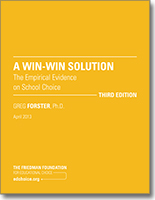The evidence points clearly in one direction. Opponents frequently claim school choice does not benefit participants, hurts public schools, costs taxpayers, facilitates segregation, and even undermines democracy. However, the empirical evidence consistently shows that choice improves academic outcomes for participants and public schools, saves taxpayer money, moves students into more integrated classrooms, and strengthens the shared civic values and practices essential to American democracy.
These results are not difficult to explain. School choice improves academic outcomes by allowing students to find the schools that best match their needs, and by introducing healthy competition that keeps schools mission-focused. It saves money by eliminating administrative bloat and rewarding good stewardship of resources. It breaks down the barriers of residential segregation, drawing students together from diverse communities. And it strengthens democracy by accommodating diversity, de-politicizing the curriculum, and allowing schools the freedom to sustain the strong institutional cultures that are necessary to cultivate democratic virtues such as honesty, diligence, achievement, responsibility, service to others, civic participation, and respect for the rights of others.
Religion & Liberty Online
A Win-Win Solution: The Empirical Evidence on School Choice
